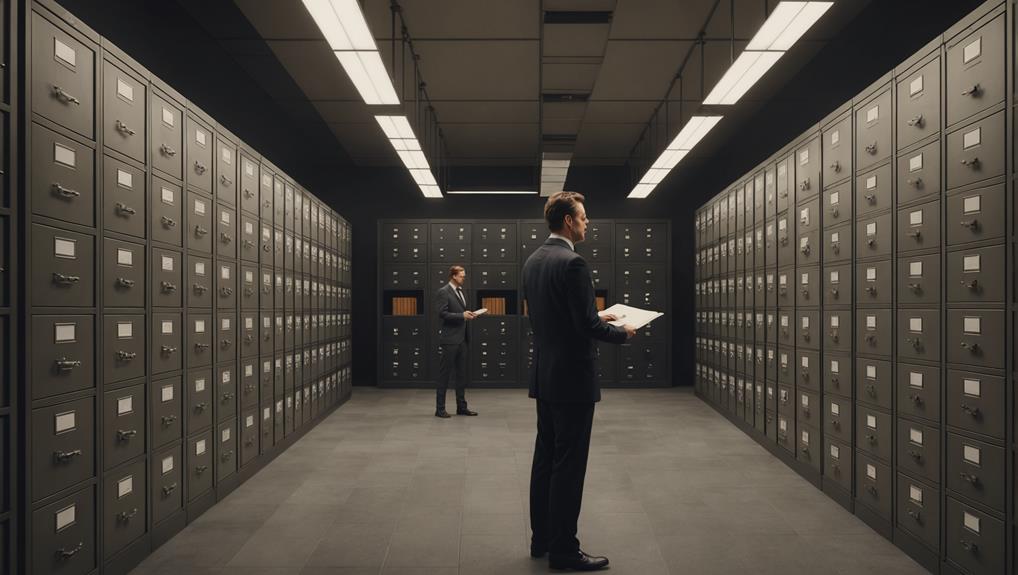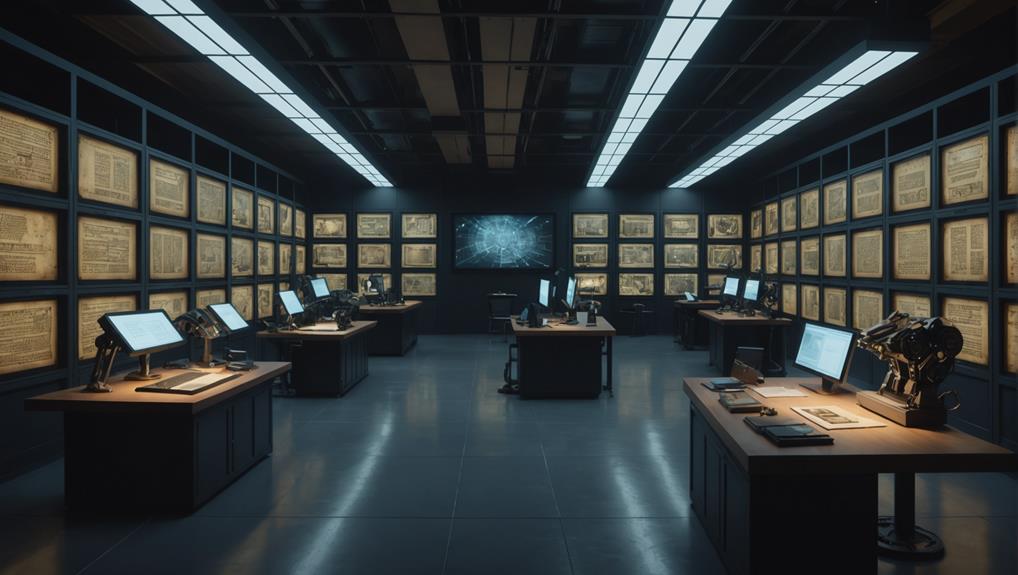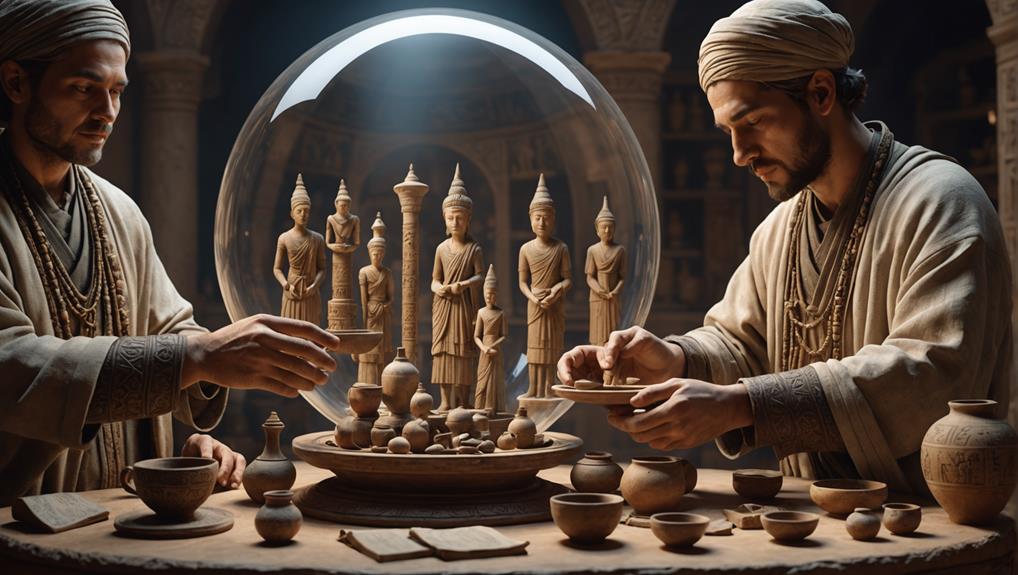
The point of archiving something is to preserve your history and ensure that future generations can access and learn from the past. By archiving, you're maintaining a tangible link to prior events and cultures, safeguarding intellectual property, and aligning with legal and compliance standards. It organizes data systematically, making it easier for you to find and reference these materials when you need them. Whether it's for personal memories, professional records, or cultural heritage, you protect and perpetuate knowledge. Archiving connects the past with the present and potentially opens up new insights for those exploring familial or cultural roots.
Defining Archiving and Its Importance

Archiving is the process of preserving information for future reference, ensuring it remains accessible and intact over time. It's about holding onto those pieces of your journey and the collective journey of your community, weaving your stories into the larger tapestry of human experience. When you archive, you're not just storing away data or documents; you're acknowledging their value and giving them a place in the narrative of tomorrow.
You're part of a broader community that cherishes its roots and looks forward to the future. By participating in archiving, you contribute to a collective memory bank, ensuring that no part of your shared history gets lost in the shuffle of time. It's a way to show that you care about the path that led you here and the paths yet to be taken.
Think of it as safeguarding the bits of knowledge and moments that define you and your community. Every newsletter, photo, or recording you preserve is a bridge connecting generations, a testament to the enduring spirit of your group. You're not just keeping records; you're keeping alive the essence of belonging and continuity, ensuring that future generations have the same sense of connection that you cherish now.
Historical Preservation and Continuity
Building on the idea of archiving, historical preservation ensures that the physical and cultural artifacts of your community endure for future generations. By safeguarding these treasures, you're not just holding onto old objects or stories; you're maintaining a tangible connection to the past. This connection fosters a sense of belonging and identity, giving you and your neighbors a shared history and a common bond.
When you walk through a historic district or visit a local museum, you're experiencing more than just a leisurely stroll or an educational outing. You're stepping into a narrative that's been carefully preserved, one that tells the story of who you are and where you come from. It's a narrative that includes everyone, inviting each member of the community to find their place within it.
This act of preservation is a dialogue between the past and the present. It asks you to engage with history, to recognize its relevance in today's world. As you contribute to this ongoing story, you ensure that future generations will have the same opportunity to explore their heritage, learn from it, and perhaps, be inspired to add their own chapters.
Legal and Compliance Needs

You must navigate various legal and compliance requirements to ensure your archival practices adhere to both local and international standards. As you embark on this journey, it's crucial to recognize that you're not alone. Many others in your community face similar challenges, creating a shared experience that fosters a sense of belonging and mutual support.
Understanding these regulations isn't just about following rules; it's about protecting the integrity of the information you hold dear and ensuring it's managed responsibly. This responsibility helps safeguard the rights of those who created or are represented in the archived materials, and it also protects you and your organization from legal repercussions.
You'll need to stay updated on legislation that affects how data is stored, accessed, and used. This includes laws related to privacy, data protection, and sector-specific regulations. Fortunately, there are resources and professionals who specialize in archival compliance. They can provide guidance and support, ensuring you meet all necessary legal obligations without feeling overwhelmed.
Safeguarding Intellectual Property
Understanding legal frameworks also means ensuring the intellectual property within your archives is well protected. It's about more than compliance; it's about sustaining the community that you're a part of and contributing to its collective knowledge and creativity. Safeguarding your intellectual property isn't just a solitary task—it's a commitment to the group's ongoing innovation and understanding.
When you protect these assets, you're not only looking after your own creations but also respecting the shared groundwork laid by others in your field. This mutual respect fosters a sense of belonging and strengthens the ties within your community, encouraging a supportive environment where ideas can flourish. It's imperative that you're aware of the various types of intellectual property—ranging from patents and trademarks to copyrights and trade secrets—and the specific actions you need to take to protect them.
Implementing robust protection mechanisms ensures that everyone in the group can safely share their insights without fear of misappropriation. This security empowers all members to contribute openly, knowing their intellectual contributions are valued and guarded. By actively participating in this protective process, you reinforce your role as a responsible member of your community, dedicated to its growth and integrity.
Data Management and Organization

Effective data management and organization streamline the way you store, access, and protect your archived materials. When you're part of a community that values preservation, it's crucial that you feel included in the processes that safeguard your shared heritage. By organizing your archives systematically, you're not just keeping track of what you have; you're also ensuring that every member of your community can find and appreciate these valuable resources.
Imagine you're searching for a specific document or piece of information. Without a clear system, this could be overwhelming. But with a structured approach, you can quickly locate what you need, making you an active participant in the collective memory of your group. This isn't just about efficiency; it's about creating a sense of ownership and belonging.
Ensuring Long-Term Accessibility
To ensure long-term accessibility, it's essential to adopt durable formats and regularly update archival methods. You're not just preserving data; you're safeguarding a shared heritage that connects us all. By selecting robust, enduring formats, you're participating in a communal effort to keep the past alive for future generations. This isn't just about saving information; it's about maintaining a thread in the fabric of our community that'll continue to inspire and inform.
As you engage in this process, you're also encouraged to actively participate in the evolution of these methods. The field of archiving is dynamic, and staying informed about the latest advancements ensures that the treasures you help preserve won't become obsolete. Think of it as a pact among fellow guardians of history. You're part of a larger narrative, contributing to a legacy that transcends individual experiences.
Moreover, this commitment to accessibility means that others can find and use these resources easily. Your efforts in creating a well-organized archive not only protect the information but also make it a living, accessible part of the community. You're providing a key to unlock collective memory, making sure that no part of our shared story gets lost in the shadows of time.
Archiving in the Digital Era

In the digital era, you face new challenges and opportunities in preserving information for future generations. As you navigate through endless streams of data, you're not just a user but a custodian of a digital legacy. This responsibility means understanding the tools and platforms that can support long-term digital preservation.
You're part of a community that values the digital breadcrumbs of our time. Whether it's preserving family photos, important emails, or your social media interactions, you contribute to a tapestry that future historians will cherish. This shared digital space connects you with others who recognize the importance of safeguarding our online interactions.
Moreover, the fragility of digital formats requires your vigilance. Unlike paper, digital files can become unreadable due to format obsolescence or data corruption. Here, you play a crucial role. By selecting reliable storage mediums and backing up data regularly, you ensure that precious memories and pivotal documents withstand the test of time.
Your efforts in archiving aren't just about keeping a record; they're about nurturing a sense of continuity and identity. As you archive, you bridge the gap between past and future, making sure that the stories that define you and your community are not lost in the digital shuffle.
Role of Archiving in Research
Archiving plays a pivotal role in research, ensuring that you have access to essential historical data and resources. It's like having a trustworthy friend who holds onto every piece of important information you might need later. Imagine you're working on a project that could change how people understand a historical event or a scientific concept. Without archives, you'd be missing the pieces of the puzzle that past researchers have put together.
You're not alone in this quest for knowledge. Think of the countless researchers around the globe who rely on archived materials to build upon previous work. By accessing archives, you're joining a community of thinkers and explorers who share your curiosity and drive for understanding. It's a connection that transcends time and space, linking you with those who walked similar paths before.
Moreover, archives aren't just about looking back; they're about looking forward. They help ensure that your research is grounded in solid evidence, allowing you to contribute confidently to your field. This isn't just about your individual journey; it's about adding your unique voice to a larger, ongoing dialogue. Through archiving, you become part of a tradition of inquiry and discovery that is crucial for the collective advancement of knowledge.
Cultural Heritage and Collective Memory

Archives not only preserve the past but also capture the essence of cultural heritage and collective memory. When you delve into these records, you're not just sifting through old papers and artifacts; you're reconnecting with the stories and experiences that have shaped the identity of your community. It's like piecing together a vast, intricate puzzle where every piece is a moment in time that someone else has lived.
These archives serve as a collective memory bank, ensuring that the struggles, joys, and lessons of the past aren't forgotten. They allow you to see how your own life is intertwined with those who came before you, providing a sense of continuity and belonging. This connection isn't just about understanding your heritage—it's about preserving it for future generations. By engaging with these records, you're actively participating in the storytelling process, adding your voice to a long-standing dialogue.
Imagine how powerful it is to hold a document that was once held by an ancestor or to read the thoughts of someone from your hometown centuries ago. These experiences stitch together the fabric of your community, making archives essential not just for knowledge, but for nurturing a shared identity and legacy.
Conclusion
You've seen how vital archiving is, from preserving history to meeting legal requirements. It organizes and safeguards intellectual property, ensuring data remains accessible over time. In our digital age, archiving adapts, maintaining its crucial role in research and cultural heritage. By archiving, you contribute to a collective memory, helping future generations understand their past, navigate their present, and shape their future. So, keep valuing and supporting these efforts—they're indispensable to our continuous growth and understanding.






